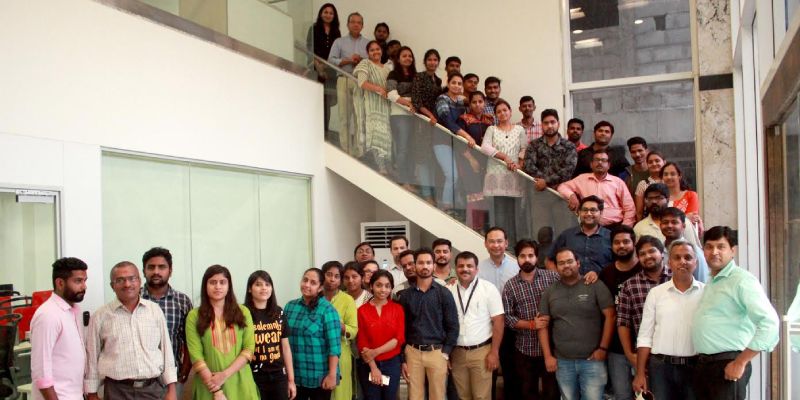
MSupply.com
View Brand PublisherMSupply.com : India’s only and fastest growing B2B e-Commerce platform in the Construction, Infrastructure and Interiors segment.
Often it takes a long time for start-ups to crack the business model and achieve a hockey stick scale. It just took couple of years for MSupply to figure the crevice in the market and enter. MSupply has a phenomenal achievement to its credit – using digitalisation to disrupt the B2B supply chain in India’s construction & interiors industry

TGC Prasad, MSupply Founder & CEO, says ‘Construction, Interiors & Infrastructure with a $600 billion dollar spend in India is almost 30% share of the GDP has only 20% share of organised brands. Rest are unorganised players and the supply chain is highly dis-aggregated and disorganised. MSupply as a B2B e-commerce player is perfectly poised to leverage this opportunity”
Often there is a misconception that construction means just steel, cement and concrete. In reality, construction has almost 50 broad categories and 150 sub-categories such as building materials, roofing, painting, tiling carpentry, glass, hardware, electrical fittings, sanitary appliances, décor etc.
Combining technology, supply, demand and access to credit to disrupt
MSupply enters into exclusive partnerships with manufacturers and sells their products to large format multi-brand wholesalers and dealers and enables a 10x growth. The MSupply digital platform – a combination of a dealer app and a customer/buyer app – forms the core of disruption. Wholesalers and dealers use the dealer app as a trading platform to buy and sell products. Retailers, builders, contractors, carpenters etc use the customer/buyer app to get quotes, raise purchase orders and buy from the wholesalers and dealers. And MSupply doesn’t charge anything for marketplace transactions between customers/retailers and the large wholesalers/dealers.
The startup also has exclusive tie-ups with non-banking financial institutions (NBFCs) and banks to provide wholesalers, dealers and retailers with credit for managing their working capital.
Identifying the right model for providing customer value and the right processes to scale
Launched in August 2015, the Singapore head-quartered start-up has already made significant headway into the Indian market and has been working with over 14,000 dealers, retailers, manufacturers. MSupply has branches in six Indian cities – Mumbai, Pune, Bangalore, Kochi, Hyderabad and Vishakapatnam and rapidly expanding to Chennai, Bhubaneshwar, Goa, Vijayawada and two tier towns of most states. The supply chain efficiency enables delivery to over 22,000 pin codes in the country, making the platform, one of its kind in this segment. The 100-member team is pegged to double in size as the start-up plans to start offices in 20 Indian cities in the next few quarters.
MSupply got Series A funding of $6 million from Artiman Ventures the same year it was launched, and series B funding of additional $7 million in 2018 from Artiman Ventures and IIML.
Tracing their journey, Prasad, says, “Like any start-up, the journey wasn’t easy at all with many experiments and failures. When the segment is vast, one has to choose a sliver, execute well and become a leader. Business model is the key. Once in place, it is now all about execution to scale rapidly”.
When the model and segment are defined well, start-ups need to have a laser focus and hardly have any scope for product or business extensions. At times, one has to let go of seemingly large and scalable opportunities and the company had to let go of certain categories such as office supplies, consumables and computer peripherals etc., which were adjacent and ancillary spaces.
TGC says, “We cannot solve the problems of every segment, every customer and every supplier. It is best to define the proposition for a specific slice, prove out the model, execute well and then expand rapidly.”
Today, MSupply focuses on bringing manufacturers’ products rapidly into the supply chain by creating demand and enhancing credit. The digital platform works on demand forecasting and inventory & logistics processes to manage fulfilment for the end customers.
A new growth tool
The start-up’s clear positioning and its ability to evolve its business model has driven growth, and MSupply hopes to be cash positive in FY 19-20. “Margins is at the core of what we do. We expect to margins to scale three times between FY17-18 to FY18-19 and we anticipate top line growth to jump 10x from FY18-19 to FY19-20,” says TGC.
He attributes scale to MSupply’s to category play, deep penetration into the dealer and wholesaler segment, product price, positioning & promotions programmes, and importantly its ability to enable access to credit in the supply chain to enable working capital.
Another growth driver which will play a more significant role as MSupply grows further is the company’s private labels. In June 2018, MSupply introduced its first private label for Tiles – “Zen”. TGC explains, “The tiles market is worth Rs 40,000 crore of which almost Rs 25,000 crore belongs to the unorganised segment. With Zen, we launched a digital catalogue of about 500 designs of soluble salt, Nano, Double charge, GVT, PGVT and vitrified tiles with superior design and quality. mSupply partners with manufacturers amenable to design thinking and willing to go the extra mile to deliver what the customer wants. We backward integrated international designs, especially Italian designs, into the manufacturing process. We are now in a position to offer new and exclusive designs more than any other player in the market. With the launch, the number of orders has grown more than 300 percent. That is what a digital platform combined with design does to unorganised business.”

Yet another private label is ‘M-Gyplast’, a product that can be used as an internal plaster, instead of traditional sand, cement etc. This helps deliver better quality, cuts construction cost and reduces cycle time. The start-up will soon launch a construction hardware tools called ‘M-Handy’ and is also actively working on launching their own electrical and plumbing brands. “For us, private labels are beginning to play a very important part of the overall strategy. This is a win-win for the ecosystem. When good manufacturers who don’t have marketing bandwidth partner with us for our private labels, we are able to drive business growth for them because MSupply is a recognised brand among the large dealer, wholesaler and retailer community.”
Growth potential and future outlook
MSupply is eyeing the $600 billion strong construction, interiors and infrastructure market in India. It’s unorganised and the opportunity is immense. Besides, India is going to be the world’s largest construction market by 2021-22. This sector is growing at almost 10 percent YoY and there is no country in the world anywhere close to this growth rate. We are tying up with global companies who would like to introduce their products into the supply chain and create demand.
When asked if digitisation has been a game changer for the B2B ecosystem in India, TGC says, “Adoption of digitisation in the enterprise supply chain was already happening for the last two decades. Today while the supply chain is technology driven, the adoption of technology by traders, wholesalers, dealers, retailers and consumers has not been imminent. But in the next three-five years, we will see app-driven platforms gaining momentum in this segment.
That said, TGC observes that demand generation in India is now changing. He adds, “Digitisation reduces time to market by rapidly marketing and launching no-name brands and products in the supply chain”.
Every start-up goes through its twists and turns before arriving at its own path and growth story. In this context, TGC says, ‘I think the one thing a start-up needs to have in its DNA is to not give up and keep rapidly adapting to evolving market changes”.








![[The Turning Point] How Oxyzo stepped out of its parent company’s shadow with India’s largest ever Series A fundraise](https://images.yourstory.com/cs/2/40d66ae0f37111eb854989d40ab39087/ImagesFrames36-1649423193276.png)


![[Startup Bharat] How Jharkhand-based LFYD is helping local businesses compete with retail giants](https://images.yourstory.com/cs/2/70651a302d6d11e9aa979329348d4c3e/Lfyd-1631173429675.png)